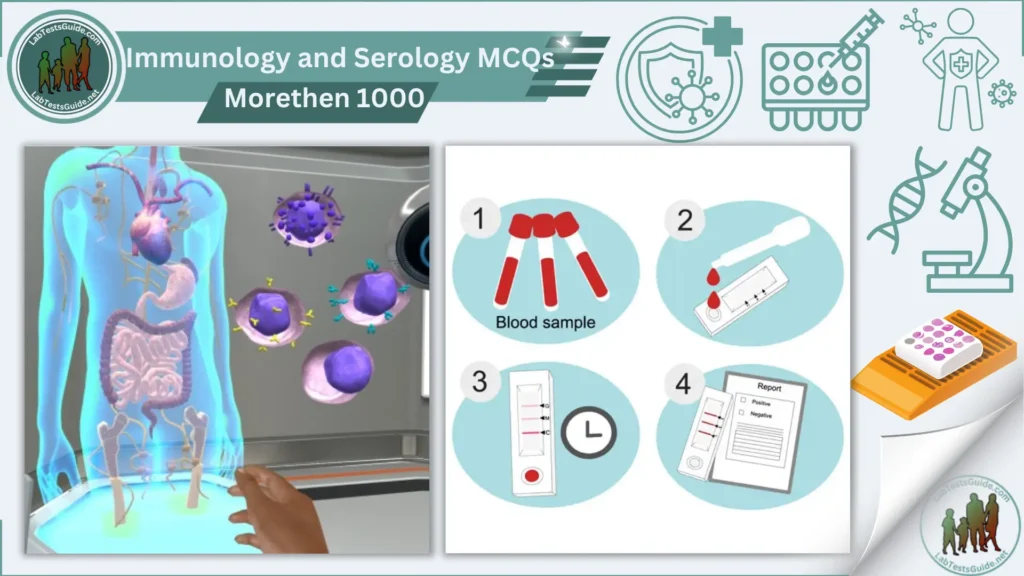Here are Morethen 1000 multiple-choice questions (MCQs) based on clinical immunology and serology, suitable for a clinical laboratory technician’s basic exam. These questions cover fundamental concepts and are aligned with instructional materials from “Clinical Immunology and Serology: A Laboratory Perspective.

Immunology is a branch of biomedical science that deals with the study of the immune system, its functions, and its disorders. It encompasses a wide range of topics, including the understanding of how the body defends itself against pathogens like bacteria, viruses, and parasites, as well as the mechanisms of immune responses. This field also explores the complex interactions between different types of immune cells, the role of antibodies, the processes of antigen presentation, and the development of immune memory. Immunologists study diseases that result from immune system dysfunction, such as autoimmune diseases, hypersensitivities, immunodeficiencies, and the rejection of transplanted organs.
Serology, a key component of immunology, focuses on the study of serum and other bodily fluids to detect the presence of antibodies and antigens as indicators of infection or disease. Serological tests are critical for diagnosing infections, monitoring immune responses, and determining blood compatibility for transfusions. These tests, which include methods like ELISA, Western blot, and agglutination assays, help identify specific antibodies or antigens related to various pathogens. Multiple-choice questions (MCQs) on immunology and serology are commonly used in medical and biological sciences education to assess students’ understanding of these complex subjects. They cover a broad range of topics, including the types and functions of immune cells, the principles of immune responses, the mechanisms of various serological tests, and the interpretation of serological results.
Immunology FAQs
- What is the immune system?
The immune system is a complex network of cells, tissues, and organs that work together to defend the body against harmful pathogens like bacteria, viruses, and parasites. - What are the main types of immunity?
There are two main types: innate (nonspecific) immunity and adaptive (specific) immunity. - What is an antigen?
An antigen is any substance that triggers an immune response, often by being recognized as foreign by the immune system. - What are antibodies?
Antibodies are proteins produced by B cells that specifically bind to antigens to neutralize or mark them for destruction by other immune cells. - What is an autoimmune disease?
An autoimmune disease occurs when the immune system mistakenly attacks the body’s own tissues. - What are T cells and B cells?
T cells and B cells are types of lymphocytes; T cells are involved in cell-mediated immunity, while B cells produce antibodies for humoral immunity. - What is immunological memory?
Immunological memory is the ability of the immune system to remember a previously encountered pathogen and respond more rapidly and effectively upon subsequent exposures. - What is the role of vaccines in immunity?
Vaccines stimulate the immune system to develop memory against specific pathogens without causing the disease, providing protection against future infections. - What is hypersensitivity?
Hypersensitivity refers to an exaggerated or inappropriate immune response to an antigen, which can cause tissue damage and disease. - What are cytokines?
Cytokines are signaling molecules released by immune cells that help regulate and coordinate immune responses.
Serology FAQs
- What is serology?
Serology is the study of serum and other bodily fluids to detect antibodies or antigens for diagnosing infections and other medical conditions. - What is a serological test?
A serological test is a diagnostic examination that identifies the presence of antibodies or antigens in a sample of blood or other fluids. - What is an ELISA test?
The Enzyme-Linked Immunosorbent Assay (ELISA) is a common serological test used to detect and quantify specific antibodies or antigens in a sample. - What is the difference between an antigen and an antibody?
An antigen is a substance that elicits an immune response, while an antibody is a protein produced by the immune system to specifically bind and neutralize antigens. - What is a Western blot?
A Western blot is a laboratory method used to detect specific proteins, including antibodies or antigens, in a sample. - What is agglutination in serology?
Agglutination is a reaction in which antibodies cause antigens to clump together, often used to identify specific bacterial infections or blood types. - What is a titer in serology?
A titer is the concentration of antibodies in the blood, indicating the strength of an immune response. - What is a rapid diagnostic test (RDT)?
An RDT is a quick serological test that provides results within minutes, commonly used for diseases like malaria or COVID-19. - What are false positives and false negatives in serological tests?
False positives occur when a test incorrectly indicates the presence of an antibody or antigen, while false negatives occur when a test fails to detect an existing antibody or antigen. - How are serological tests used in blood transfusions?
Serological tests ensure compatibility between donor and recipient blood by checking for matching blood types and absence of harmful antibodies.
Possible References Used





